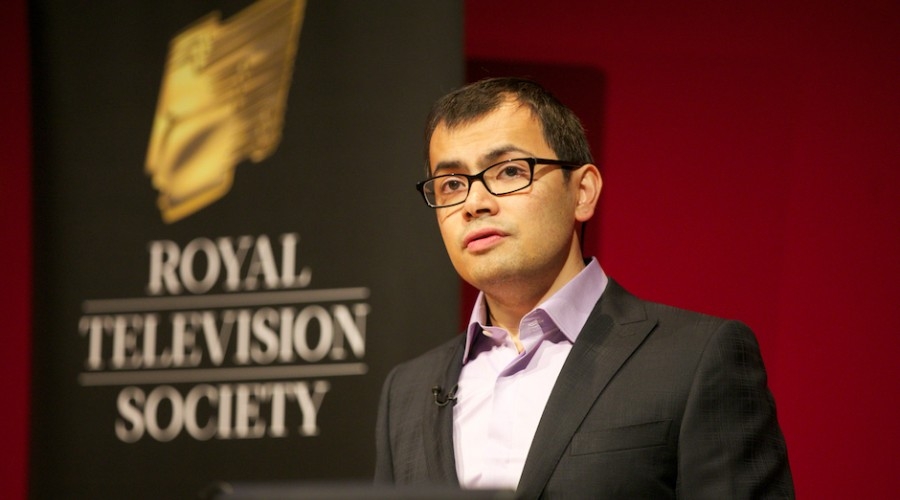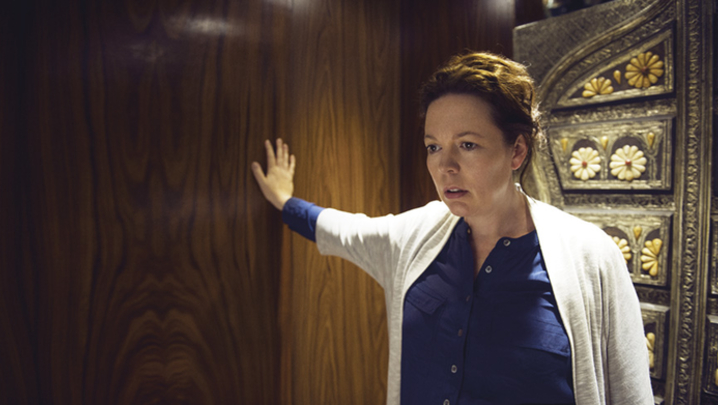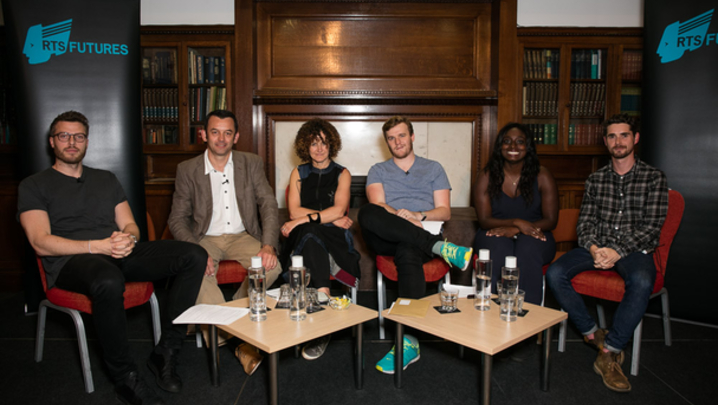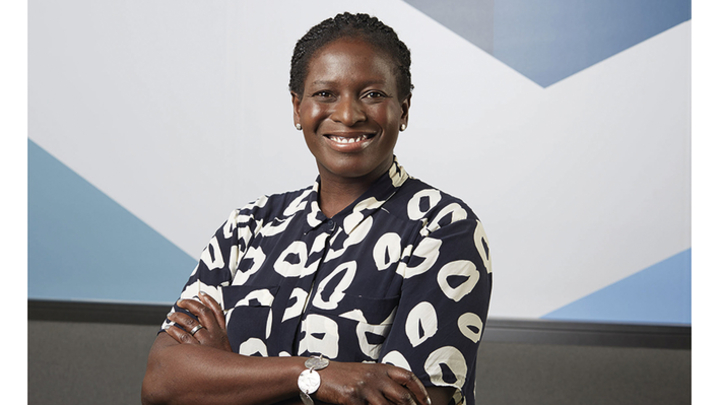Demis Hassabis reflects on the obstacles to building intelligent machines that could make TV shows
Television creatives let out a collective sigh of relief as artificial-intelligence expert Demis Hassabis ruled out the possibility of computers taking their jobs from them any time soon.
“We are a long way from machines being truly creative,” said the co-founder of machine-learning start-up DeepMind Technologies. But, Hassabis warned: “I don’t think it’s impossible.
“Most people’s jobs in the audience are safe for a long time. I don’t think there are going to be any [computer] directors of the quality of, say, Ridley Scott, if ever – that’s one of the last things that a computer will be able to do,” Hassabis continued. Humans, he argued, have “aesthetic judgement”.
Hassabis was giving the second RTS/Institution of Engineering and Technology Joint Public Lecture, which was held this year at the British Museum in early November. The inaugural lecture, last year, was given by technology entrepreneur Mike Lynch at London’s Royal Society.
“We want to solve intelligence. What we’re interested in is understanding natural intelligence, that is, the human mind, and then recreating it artificially, and then using that technology to help us solve everything else,” he explained.
BBC Worldwide chief Tim Davie chaired the talk. “We are lucky enough to be enjoying another golden age of advancement that demands public engagement and debate,” he said. “Artificial intelligence in recent years has become one of the hottest topics, dominating the media and the imagination of the public.”
The subject of Hassabis’s lecture was artificial intelligence, which he defined as “the science of making machines smart”, and its likely impact on the future. He accepted the invitation, partly, he said, because “I love the idea of bringing together the RTS and the creative arts with the engineering [focus] of the IET”.
Hassabis, 39, set up DeepMind in 2010, describing the company, which has at its disposal almost 150 of the world’s top research scientists, as an “Apollo programme for artificial intelligence – a moon-shot project that focuses on ambitious, long-term goals”.
“We are trying to combine the best from Silicon Valley start-ups with the best of academic institutes such as MIT, UCL and Cambridge, to see if we can fuse that and find a new, hybrid way of doing science that is more productive and efficient, while still allowing for extreme creativity,” said Hassabis.
DeepMind’s aims, which are nothing if not ambitious, are twofold: “We want to solve intelligence. What we’re interested in is understanding natural intelligence, that is, the human mind, and then recreating it artificially, and then using that technology to help us solve everything else,” he explained.
Hassabis admitted that the latter may seem “a little bit far-fetched, possibly a bit fanciful to some of you, but we really believe that step two naturally follows from step one”.
The question on the lips of the many TV people in the audience was whether artificial intelligence could help to solve any of the industry’s pressing problems. Channel 4 Chief Executive David Abraham asked whether Hassabis was working on recommendation engines that could be used by broadcasters to match viewers with shows they would want to watch.
“We are looking at recommendation systems in all sorts of forms – it’s a very interesting area and something our technology is applicable to,” he replied.
The aim, Hassabis continued, was to “model user journeys in a way that delivers much more compelling content or recommendations. The current systems we have are not good enough.” He predicted that new and better recommendation systems would be available in “four or five years”.
“Personalisation is one kind of technology that might help but it doesn’t really work because it is based, at the moment, on quite primitive technology, which doesn’t give unique recommendations to what I would call [a person’s] long tail of interests.”
Hassabis identified “information overload” as one of the biggest problems facing society – and TV, too. “In the world of television, there are so many channels and modes of watching things – how can [viewers] find what they are interested in?
“Personalisation is one kind of technology that might help but it doesn’t really work because it is based, at the moment, on quite primitive technology, which doesn’t give unique recommendations to what I would call [a person’s] long tail of interests.”
DeepMind was bought by Google for a reported £400m in January 2014. Hassabis is now Vice President of Engineering at Google DeepMind and in charge of the company’s artificial intelligence projects. He defended the decision to sell the company –a member of the audience said that he had “taken the Yankee dollar”.
“We decided to join forces with them, partly because the people high up at Google thought that [our] ethics committee was a good idea. We had already ruled out obvious things such as military or intelligence applications,” replied Hassabis.
Almost two years after the sale, Hassabis pointed out that DeepMind had kept its London headquarters. “We’ve invested in our research team in King’s Cross – the whole of DeepMind is still UK-side. We work as a semi-autonomous unit,” he said.
Some scientists, including Stephen Hawking, have expressed concerns about artificial intelligence becoming too powerful. He told the BBC late last year that it “could spell the end of the human race”. He feared that it could “take off on its own and redesign itself at an ever-increasing rate”.
Hassabis accepted that artificial intelligence posed ethical questions: “As with all powerful, new technologies – and artificial intelligence is no different – we have to be cognisant about using them ethically and responsibly.
“Although human-level, general artificial intelligence is many decades away, I think we should start the debate now.”
Question & answer
Q. What role could artificial intelligence play in health diagnosis and treatment?
A. Demis Hassabis: Health care is one of the main application areas we’re focusing on… I think we could revolutionise the quality and efficiency of care.
Q. How can artificial intelligence help the creative process and the creation of media?
A. Demis Hassabis: I think that’s a lot tougher. Recommendation is the obvious [use] but we are looking at things such as music, which is more [suitable] for computers than visuals, which are incredibly hard. There is some very interesting work being done in music composition and analysis.
Q. Why did you decide to publish the codes you design and were you ever concerned that they might fall into the wrong hands?
A. Demis Hassabis: We try to be as open as possible about what we’re doing, so we generally publish almost everything.…
It may not always be the case for the stuff we do, and we will have to consider that on a case-by-case basis. But, in general, where we can, we like to engage and support the academic community.
We think it is important that knowledge is shared – that’s the way that humanity can advance
as quickly as possible.
Q. There is concern from, among others, Stephen Hawking, about artificial intelligence: in effect, once you let the genie out of the bottle, we’re all fucked. What do you think?
A. Demis Hassabis: I’ve had a long chat with Stephen Hawking about this and… I think he was quite reassured after we talked about how, specifically, we were approaching it.…
There are big issues here [but] the problems are much more prosaic at the moment and it’s easy to get carried away with science-fiction scenarios that are many decades away.
Deep Blue: good at chess, but hopeless at noughts and crosses
‘We’re interested in artificial general intelligence, the idea of a general learning system,’ explained Demis Hassabis. This is different from ‘narrow artificial intelligence’, which has been built in a bespoke way for one specific task, such as self-driving cars or the intelligent personal assistant, Siri, on Apple smartphones.
The most famous example of artificial intelligence remains the man-versus-machine chess contests in 1996, when man triumphed, and 1997, when the machine took its revenge.
‘This was a watershed moment in artificial intelligence, when IBM’s Deep Blue beat [world champion] Garry Kasparov in a six-game chess match,’ Hassabis explained.
‘I came away more impressed by Kasparov’s mind than the Deep Blue machine. It was an impressive engineering feet, but Deep Blue was programmed by a major team of programmers along with a bunch of chess grandmasters trying to distil chess knowledge into an algorithmic construct.
‘Deep Blue was very good at chess but no use at anything else, including simpler things such as playing noughts and crosses. Nothing that Deep Blue knew or that was in its code would have helped it with something simple like that, let alone other things such as speaking languages or driving a car, which Gary Kasparov could do effortlessly.’
From gaming to neuroscience
The origins of Demis Hassabis’s interest in artificial intelligence lie in games – initially chess, which he played from the age of four. His interest in gaming continued into adulthood and Hassabis is a five-times world games champion.
Hassabis bought his first computer – a Sinclair ZX Spectrum – at the age of eight with winnings from a chess tournament and taught himself to programme. ‘I realised on an intuitive level that a computer is a special type of machine,’ he said. ‘They extend the capabilities of the brain.’
At the age of 17, Hassabis programmed the popular game Theme Park, which came onto the market in 1994. ‘My love of computers and games came together in an obvious way, in the designing of video games,’ he recalled.
‘In the early and mid-1990s, computer games were pushing the cutting edge of engineering,’ he continued. ‘Furthermore, the games I used to design and programme all involved artificial intelligence as a core game-playing mechanic.’
Theme Park was a business simulation game that challenged players to design a profitable Disneyland-type park, which ‘spawned a whole genre of management simulation games’, said Hassabis. ‘The artificial intelligence adapted to the way the player played the game, so every single person who played had a unique experience,’ he said.
Hassabis worked in commercial gaming and founded the games company Elixir Studios, producing award-winning games for Microsoft and Universal, before returning to academia. He already possessed a double first in computer science from Cambridge University; now, he signed up for a PhD in cognitive neuroscience at UCL.
‘This was another piece of the puzzle that I needed before launching a [project] such as DeepMind. I wanted to understand more about how the brain solves tough problems such as imagination and memory,’ he said.
The scientists at DeepMind use video games as a test bed for the capabilities of artificial intelligence. ‘It’s very easy to measure progress, because most games have scores, so you can see if your algorithmic tweaks are gaining you an advantage and taking you in the right direction,’ explained Hassabis.
DeepMind has recently developed artificial intelligence that can play Atari games from the 1970s and 1980s, including Breakout, better than humans. Overnight, it taught itself to play the much-loved game, moving quickly from novice to world beater.
The 2015 RTS/IET Joint Public Lecture was given by Demis Hassabis at the British Museum in central London on 4 November. The producer was Helen Scott.







